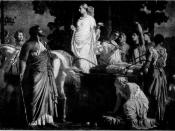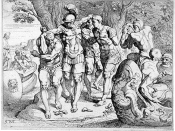When observing unfamiliar societies, it is only natural to criticize from the perspective of one's own society. It is thus expected that ancient societies, such as the Greeks, judged the lands of their conquests by their own society. In conjunction with the effects of perspective, the patriotism and ethnocentrism that marked Greek societies also played a great role in creating a sense of "them vs. us". This is evident from the comparisons of cultures made in many of the great classics. In particular, the classical authors of The Odyssey, The Aeneid and Histories all convey the theme of "them vs. us" through their portrayals of Xenoi.
Homer in "The Odyssey" brings up this sense of "them vs. us" when he depicts Odysseus telling the Phaiakians the obstacles of his journey home. Before beginning his tales of the Lotus-eaters and the Cyclopes, Odysseus is described as saying , "So it is that nothing is more sweet in the end than country and parents ever, even when far away one lives in a fertile place, when it is in alien country, far from his parents" (Odyssey [Book 9, Lines 33-36]).
Here Homer shows Odysseus' bias that no land can compare to his home. Odysseus is somewhat bound to dislike foreign lands. This statement seems hypocritical in that Odysseus is in fact in the land of the Phaiakians partaking in their symposium, which he also praises. However, it is important to note that despite the similarities between the Phaiakians and Odysseus' homeland, Odysseus still wants to go home to where his family is. It is not the culture that he misses, but the family. In the brief depiction of the Lotus-Eaters that follows, Homer again depicts this theme when Odysseus focuses on the distinct foods in the different societies. Odysseus is shown to...


